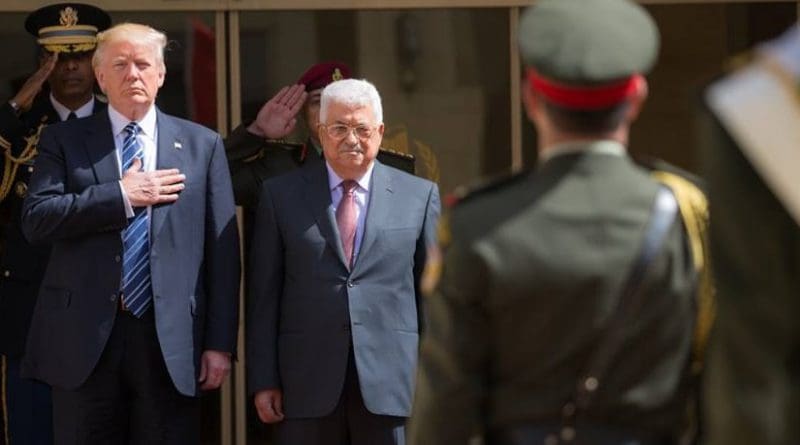Can Trump Clinch The ‘Ultimate Deal’? Don’t Hold Your Breath
By Arab News
By Sharif Nashashibi *
Last month’s visit to Jerusalem and Ramallah by Donald Trump’s son-in law Jared Kushner was a somewhat low-key affair that received relatively little media coverage. This is not necessarily what one might have expected from the new peace broker’s first foray into the Israeli-Palestinian quagmire.
But that was no bad thing for the otherwise attention-craving US president, because Kushner came and went empty-handed — hardly a promising start to Trump’s stated desire to reach the “ultimate deal.”
The aspect of the visit that arguably garnered the most media attention was Kushner’s meeting with Palestinian Authority (PA) President Mahmoud Abbas, which reportedly did not go well at all. Reflecting the media’s general assessment of the meeting, the Times of Israel said Abbas was left “enraged” and “fuming.”
But it was clear even before Kushner’s arrival that there would be no progress. The day before he landed in Israel, Prime Minister Benjamin Netanyahu announced the start of construction of a new Jewish settlement in the occupied West Bank, part of a colonial expansion that has picked up considerable pace since Trump took office.
Indeed, in March The Guardian reported that “Israel has indicated it will pursue a unilateral policy of largely unconstrained settlement expansion in the occupied Palestinian territories.” Israel is openly emboldened by a US president who has said “there’s nobody more pro-Israeli than I am.”
And the White House has said he does not see settlements — which are illegal under international law and violate a number of UN Security Council resolutions, the most recent one passed in December 2016 — as an “impediment to peace.”
Israeli announcements of settlement expansion just prior to or during visits by US envoys is nothing new. But whereas during the Obama administrations this was done as a slap in the face of a president who clashed with Netanyahu over the issue, it is a very different case with Kushner.
His family’s charitable foundation, of which he is a director, has made donations to West Bank settlements. As such, the man tasked with forging Israeli-Palestinian peace may have no ideological objection to one of its biggest obstacles.
At the meeting with Abbas, Kushner and Trump’s international negotiator Jason Greenblatt “sounded like Netanyahu’s advisers and not as honest mediators,” a Palestinian source told Israel’s Haaretz newspaper. It boggles the mind that Palestinian officials still hold out hope that any US administration can act as an honest broker.
Whether Democrat or Republican, for decades American politicians — including presidential candidates — have fallen over themselves to court the powerful pro-Israel lobby in the US by professing their unflinching support for Israel, whose interests are prioritized above all others in the Middle East. This pledge of allegiance is practically a rite of passage, one that is faithfully implemented when in office (even Barack Obama was no exception to this time-honored tradition).
But unlike previous US administrations, Kushner’s task is hampered by the number of other major — and disparate — government jobs Trump has given him, as if Israeli-Palestinian peace was not elusive and difficult enough.
Kushner’s other roles include being the primary point of contact with more than two-dozen countries, and as US news channel ABC reported, reforming the criminal justice system and veteran care; running the Office of American Innovation; tackling the opioid epidemic; and the small matter of “revamping the entire federal government.”
As news satirist John Oliver put it: “Jared’s portfolio would be unmanageable for the smartest man on Earth.” It certainly raises questions as to how much — or indeed how little — of a priority resolving the Israeli-Palestinian conflict is to Trump, when it seems like a mere side-job for Kushner.
Moreover, current regional and domestic circumstances are only galvanizing Israel’s trademark intransigence toward the Palestinians. Much of the Middle East is in turmoil; attention and concern are focused on Iran’s expanding regional footprint; years-long tensions between the two main Palestinian factions, Fatah and Hamas, are escalating; and the PA’s shameful security coordination with Israel has left it essentially managing the occupation of its own people.
As a result of all this, Israel — whose society and polity have shifted decidedly to the right — has no incentive to engage diplomatically in any meaningful way. Palestine used to be the issue in the Middle East. Now it is one of many. That is a gift not just to Israel but also to the Trump administration, because it means its inevitable failure to clinch the “ultimate deal” may slip largely under the radar.
• Sharif Nashashibi is an award-winning journalist and commentator on Arab affairs.

